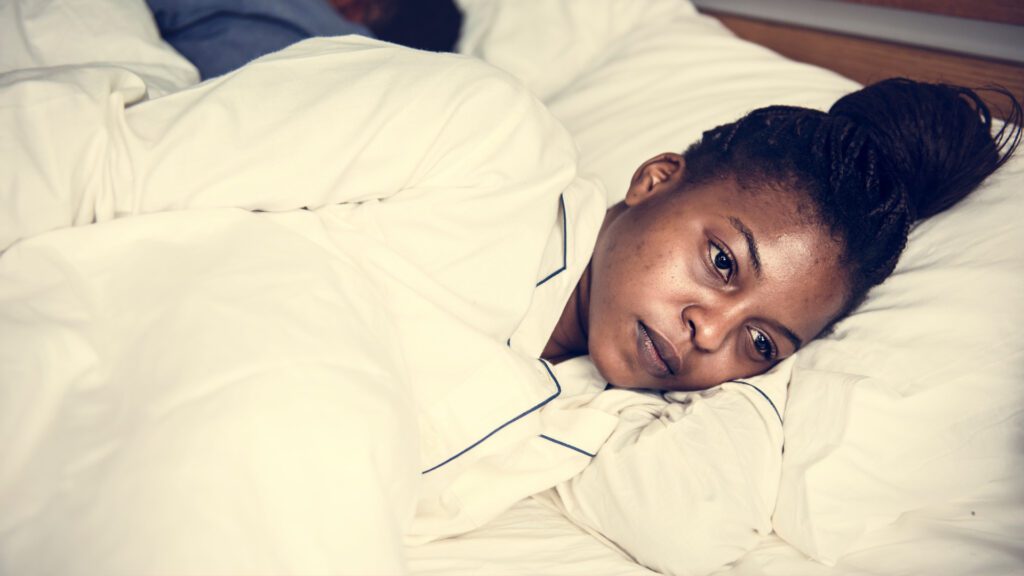Written By: Abby Jellinek-Johnson, MS, RDN, LD, CLT
When we think about weight loss, we typically start thinking about changing two things; improving our diet and embarking on an exercise program. But ask yourself; is getting a good night’s sleep as high on your priority list as your diet and exercise?

Numerous studies have identified a correlation between sleep and bodyweight. One such study was done at Case Western Reserve University. In this study, 68,183 ladies were followed for 16 years. It was concluded at the end of the study that women who slept less than five hours were 30% more likely to gain 30 pounds over those 16 years than those ladies that averaged over 7 hours of sleep. (Patel et al. 2006)
Another study out of the Stanford University School of Medicine revealed similar findings. During the study, the researchers ex-amined the sleep patterns of 1,024 volunteers between the ages of 30 and 60. Study volunteers underwent nocturnal polysomnography (a test during which a number of physiologic variables are measured and recorded during sleep) and blood sampling once every four years. They also reported on their sleep habits every five years through questionnaires and six-day sleep diaries. The findings revealed that people who slept less than 5 hours compared with those who slept 8 hours per night have 3% higher Body Mass Index (BMI).(Taheri et al. 2004)
So, what is the connection to sleep and a healthy weight?
There are two major hormones that contribute to how successful we are in our nutritional efforts to be a healthy weight; leptin and ghrelin. Leptin is a hormone produced in the fat cells and is responsible for sending a signal to the brain that you are full after you have eaten enough. Ghrelin is produced in the gastrointestinal tract and sends a signal to the brain to let you know that you are hungry when it is time to eat. When quality sleep is compromised in the body, leptin levels are decreased which interrupts your body’s ability to determine that you are full; this will typically lead to overeating. In addition, ghrelin is produced in higher amounts which means your body is sending a signal to the brain that it is time to eat even when it is not; this too can likely to lead to overeating.
People who sleep less are more likely to crave high carbohydrate and sugary snacks instead of the nutrient dense foods that will help you lose weight and nourish your body. Think about it; the last time you were short on sleep were you more likely to crave a donut or a nice kale salad? One of the reasons this happens can be traced to another hormone called insulin. Lack of sleep can lead to decreased insulin sensitivity. Insulins job is basically to help our body use the sugar or carbohydrates we eat. Insulin helps us take sugar out of our blood and deliver sugar to our tissues where it can be used for energy. If your body is not sensitive to insulin, you cannot adequately use the carbohydrates you have eaten and so you crave more. It’s like having money but not being able to find it so you need to find more money. Numerous studies have demonstrated that inadequate sleep can quickly lead to a decrease in insulin sensitivity (Flint et al. 2007; Buxton et al. 2010).
The National Sleep Foundation recommends 7 to 9 hours of continuous sleep for adults 26-64 years of age. Setting a schedule that allows for adequate sleep is essential to optimal health in addition to maintaining a healthy weight. Here are some helpful tips for getting a proper night’s sleep:
Make the room as dark as possible. This means putting your phone upside down on the dresser, turning off the television, not using a tablet or laptop in bed, and blocking any other sources of lights such as cable boxes, Sources of light after dark suppress the production of melatonin in the brain making it harder to fall asleep and stay asleep. Your brain basically still thinks there is stuff to do so it doesn’t make it easy to fall asleep.
Set your thermostat to cool. Many sleep experts say that a cool room, somewhere around 65 degrees, makes for the best sleep.
Your sleeping environment should be quiet. This means not falling asleep to the television. If you live in an area where there is a lot of noise outside that can interfere with sleep, a white noise machine or white noise app may help to block out some of the sound. White noise works by reducing the difference between background sounds and a “peak” sound, like a door slamming, giving you a better chance to sleep through it undisturbed.
For more information on sleep and why it is important, visit www.sleepfoundation.org. For helpful tips on getting more quality sleep visit www.sleep.org.
Abby Jellinek-Johnson is registered dietitian at Harmony Nutrition in Alpharetta Georgia. To learn more, visit www.harmonynutritionatl.com.
